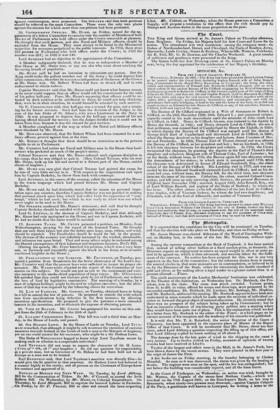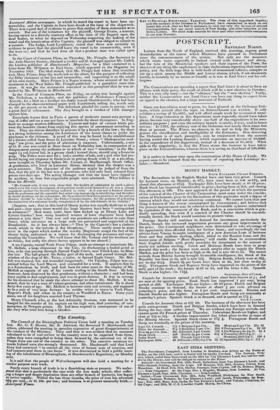-----
In the Court of Exchequer, on Wednesday, an action was tried, brought by Mr. Watson, the Captain of the steam-boat Rothsay Castle,—which was wrecked on the 17th August 1831, on the Dutchman's Bank, on her way to Beaumaris, When ninety-two persons were drowned,—against Captain Colquitt of the Navy, a gentleman well known in Liverpool, for writing a letter to the
Liverpool Albion newspaper, in which he stated the vessel to have been un- seaworthy, and the Captain to have been drunk at the time of the shipwreck. There was a good deal of evidence to prove that. neither of these statements were correct. But one of the witnesses for the plaintiff, GeorgeEvans, a seaman, having sworn to a directly contrary effeet at the time of the Inquest upon the dead bodies, to what he deposed on Wednesdarrespecting the leaking of the vessel and the intoxication of the Captain, the plaintiff was obliged to submit to a nonsuit. The Judge, Lord Lyndhurst, stated that there was certainly no evidence to prove that the plaintiff knew the vessel to be unseaworthy, even if he were so; and that he had done all that a prudent man was called upon to do.
In the Court of Common Pleas, on Thursday, Mr. Pringle, the Secretary to the And-Slavery Society, obtained a verdict and 5/. durnages against Mr. Cadell, the London publisher of Blackwood's Magazine, for a libel contained in a letter from Mr. 31•Queen to Earl Grey, which appeared in the Magazine for November 1831. The libel stated, that Mr. Pringle had taken that wretched tool, Mary Prince, from the wash-tub to the closet, for the purpose of collecting the filthy statement of her lies and immorality, and impressing it on the minds of his own family. Mary Prince is a Negro woman, whose account of her ill- treatment in the West Indies Mr. Pringle published in a pamphlet some time since. It was for the statements contained in this pamphlet that he was at- tacked by Mr. 11•Queen in BlackwOod.
In the Court of Common Pleas, on Friday, an action was brought against Mr. Nicholson' a tea-dealer, and the publisher of Nicholson's Commercial Gazette, for a libel on a brother tea-dealer 'named Shuttleworth ; who had been charged In the abovementioned paper with fraudulently selling tea, worth only 4s. 6d. per pound, at 8s. 6d. The defendant pleaded his cause in person, with a great deal of vehemence. The Jury brought in a ierdiet of 150/. damages against him. .
Everybody knows that in Paris a person of moderate means may procure a cup of coffee and see a one-act farce or interlude for about threepence. In Eng- land we manage matters differently. Licences and taxes of various kinds pre- vent the humbler classes from enjoying this !species of amusement according to law. They are driven therefore to procure It by a breach of the law ; for there is a strong inclination among the Londoners of -the lower classes to prefer the playhouse to the alehouse. Aproof of this may be found in the establishment . .of a theatre called Sans Souci Leicester Street ; where " Shakspearian read- ings" are given, and the price of admission is sixpence. Unfortunately, a sort of 0. P. row was raised at Sans Souci on Wednesday last, in consequence of a disagreement among the audience as to which of two " wocalists, as the Ma- nager (a red-haired lad, in a greasy cloak) termed them, should sing a favourite song: The Police were sent for ; and a number of lads, and a girl who had pre- ferred laying out sixpence in theatricals to getting drunk with it at a gin-shop, were brought on Thursday before Mr. Conant, at Marlborough Street Office. A gentleman, who lived an Leicester Street, declared that the theatre was a great nuisance. The character of the audience might be judged of from the fact, that the girl at the bar was a prostitute, who had only been released from prison two days ago. The acting Manager said that she must have slipped in by accident, as none but respectable people were admitted. What follows is from the Herald.
" Mr. Conant said, it was very clear that the facility of admission to such a place, which even the worst description of characters could avail themselves of, was a strong argument against the theatre being suffered to exist. As it was nut a licensed theatre, both the policeman and the constable had acted wry improperly in interfixiny, and therejlire he shmdd discharge all the thicndants. He then directed that these practices at the private theatre should be laid before the Police Commissioners, for the purpose of procuring the extinction of a nuisance loudly complained of by the inhabitants in its vicinity."
[Suppose now, that in this land of liberty justice was equally dealt out to rich and poor—how many times would the large theatres have been "extinguished as nuisances?" How many rows have been kicked up at Drury Lane and Covent Garden? how many hundred women of loose character have found admissien into them ? One row and one prostitute are sufficient to ruin Sans Souci while nuisances on a large scale are patronized and supported at the Domianiels. So it has always been—" That in the Captain's but a choleric word, which in the *private is flat blasphemy." There surely must be some ,error in the report which makes the worthy Magistrate assign the fact of the theatre being unlicensed as a reason for discharging the prisoners and repri. mending the Constables. We well know that Mr. Conant and his brethren are no Solons, but really the above decree appears to be too absurd.] A sea Captain, named Noah Pease Folgar, made an attempt to assassinate Mr. W. Mellish, a large shipowner in the City, by discharging a loaded pistol at him, as he was passing through Spread Eagle Court, near Finch Lane, on Mon- day last. The ball grazed the fleshy part of the neck, and passed through the window of the shop of Mr. Terry, a tailor, in Spread Eagle Court. Mr. Mel- lish was stunned, but not wounded dangerously. On Tuesday, Folgar was ex- amined before the Lord Mayor, and remanded for a week. It appears that he is a Kentuckian by birth, and had been for some years in the employ of Mr. Mellish as captain of one of his vessels trading to the South Seas. He had, however, been dismissed by that gentleman, without a character ; and had been since Unable to find employment, and was in great distress. It was in revenge for his dismissal that he made the above attempt to shoot Mr. Mellish. It was stated, that he was a man of violent passions, and often intoxicated. He is about forty-five years of age. Mr. Mellish is between sixtvand seventy, and supposed to be a man of very large fortune : he resides when in town in York Place, Regent's Park, -and when in the country at Woodford in Essex. Some years since, one of his daughters married Lord Thynne.
Henry Channel!, who, at the last Admiralty Sessions, was sentenced to be hanged for the murder of his captain on the lugh seas, died yesterday, of con- sumption, in Newgate prison. He had been respited in consequence of one of the Jury who tried him being a Quaker.















 Previous page
Previous page